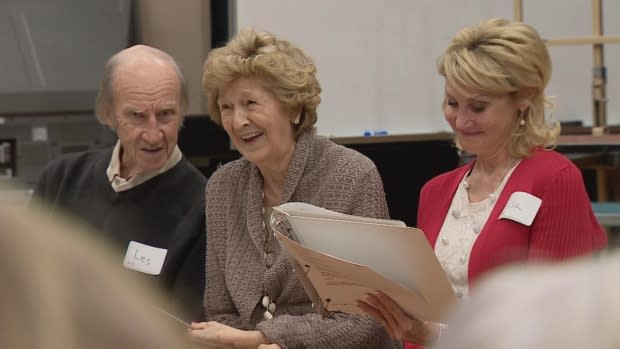Dementia patients and their caregivers reconnect through choir program
A pilot project that combines choir and music therapy is giving dementia patients and their caregivers a chance to do something they both love to do, together — a rarity, says Cindy Johnson, 53, who is used to dropping her mom off to do dementia-focused activities on her own.
Johnson registered the two of them in a new 15 week choir program called Memory Lane Chorus.
"It just gives us a wonderful activity that we can do together because every day is sort of a challenge to find something something fun for us to do together to, to enjoy every moment," said Johnson.
Johnson says she used to sing in a choir with her mom before the 80-year-old was diagnosed with Alzheimers eight years ago. And she says this opportunity to sing side-by-side once again prompted a few tears.
"So tears, yeah tears," says Johnson.
"How come you got tears?" asks her mother, Hedy Luijkz.
"Because it was really nice to sing with you again," responds Johnson, as she wipes more tears from her eyes.

Music therapy
Memory Lane Chorus was developed by Youth Singers of Calgary, a non-profit performing arts organization for all ages, with the help of JB Music Therapy, a team of accredited music therapists who design treatment plans to help boost mood, improve speech, and recover lost memories, among other things.
"We have got a number of programs that have grown out of a community need and out of people in our world saying that this is something that they are missing. So this is one more in that realm of what we do here at Youth Singers," says Alida Lowe, the performing arts group's senior program production and touring manager.
"It's a pretty special thing to see."
Lowe says she was a little surprised to see the waves of emotion wash over the room during the first session. But she says that's the nature of music.
"You know we had kind of anticipated it being a really reminiscent experience, having lots of old favourites of people who have music kind of locked in their heads. I was thrilled to see that come through," says Lowe.
No experience necessary
Lowe says singing experience is not necessary. Song sheets are provided and the program is led. Some of the song choices included Edelweiss from The Sound of Music, Ian Tyson's classic Four Strong Winds and My Bonnie with accompanying piano or guitar.

Music Therapist Laurie Callao-Perez says music can have a powerful effect on the body, whether it stimulates the release of oxytocin, a hormone that improves social bonding and the creation of group memories, or improves breath support and speech. She says music can also help make new connections with others going through the same thing.
Callao-Perez says the first session went better than she'd expected.
"I think the group just really came together. The group dynamic was really great and people were singing. People were engaging with one another with their loved one or with their caregiver," says Callao-Perez.
Cindy Johnson says this choir program not only helps her rekindle memories of singing with her mom, but it also helps her realize she is not alone.
"For me it was just even seeing other people who are in the same position as I am who are looking after their parent or their loved one," says Johnson.
"That we can sing together and be in this, they're in the same boat as we are."
Memory Lane Chorus began January 9th, and will run every Wednesday afternoon at the Performing Arts Youth Centre. Registration will remain open for the first five weeks for those who still want to sign up.
It's $25 per class or $375 for the whole session.

